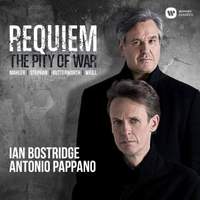Recording of the Week,
Requiem: The Pity of War from Ian Bostridge and Antonio Pappano
I feel as if today’s Recording of the Week warrants a content-warning of sorts, in that it features not only some of the most exquisitely beautiful singing and playing I’ve heard this year but also some of the ugliest – and for that very reason (plus several others beside), it’s also a contender for my personal Recording of the Year.
 Released to commemorate the centenary of Armistice Day, Requiem: The Pity of War (out today on Warner Classics) sees Ian Bostridge and Antonio Pappano joining forces for two song-cycles by composers who lost their lives in the Great War and two groups from figures who anticipated or reflected on its horrors: Butterworth’s A Shropshire Lad, Rudi Stephan’s Ich will dir singen ein Hohelied, Kurt Weill’s Whitman Settings, and three songs from Mahler’s Des Knaben Wunderhorn.
Released to commemorate the centenary of Armistice Day, Requiem: The Pity of War (out today on Warner Classics) sees Ian Bostridge and Antonio Pappano joining forces for two song-cycles by composers who lost their lives in the Great War and two groups from figures who anticipated or reflected on its horrors: Butterworth’s A Shropshire Lad, Rudi Stephan’s Ich will dir singen ein Hohelied, Kurt Weill’s Whitman Settings, and three songs from Mahler’s Des Knaben Wunderhorn.
The album opens by lulling us into a false sense of security: as Butterworth’s pastoral idyll warms gently into focus, with incredibly delicate pianism from Pappano complementing Bostridge’s trademark floated head-voice, we could be listening to a bonus track from The English Songbook from twenty years ago (one of the tenor’s earliest recordings, which remains one of my all-time favourite recital-discs in this or indeed any genre). When I reviewed Bostridge and Pappano’s contribution to the Britten centenary in 2013, I remember describing the singer as a vocal Dorian Gray, and the comparison still holds – at least in this early stretch of the album, where his light, boyish timbre is eerily appropriate for the evocation of ‘the lads that will never be old’. As in the later Mahler selection, stark new light is thrown on songs which are usually the province of robust baritones: ‘The Lads in their Hundreds’ are described with an off-hand chattiness that’s more moving than valedictory sentimentality, and the ghostly dialogue of ‘Is my team ploughing?’ is conjured with the same interplay of vulnerability and viciousness that Bostridge famously brings to Schubert’s Erlkönig.
From Butterworth, we move onto the curiosity of the album: a fascinating six-song cycle by the German composer Rudi Stephan, killed on the Galician Front a year before Butterworth’s death in The Battle of the Somme. The texts (by Gerda von Robertus) are mostly oblique in their anticipations of war, via graphic nightmares of horrors to come and uneasy dreams of estranged loved ones, and they’re shot through with flashes of homoeroticism which call Britten’s Michelangelo Sonnets to mind; Stephan’s responses, though, are closer to the musical language of Berg and Debussy, and testify to a voice of enormous potential cut down in its prime.
 Largely composed during World War Two and setting poetry written in response to the American Civil War, Kurt Weill’s Whitman Songs were new to me, and they play to many of Bostridge’s strengths: the sardonic savagery of ‘Beat! Beat! Drums!’ is writ large with snarls and rasps from voice and piano alike, whilst the long narratives of ‘O captain! My captain!’ and ‘Come up to the fields, father’ demonstrate what superb storytellers both of these artists are, Pappano summoning near-orchestral ranges of colour from the keyboard and Bostridge delineating each individual voice as if performing a one-man opera.
Largely composed during World War Two and setting poetry written in response to the American Civil War, Kurt Weill’s Whitman Songs were new to me, and they play to many of Bostridge’s strengths: the sardonic savagery of ‘Beat! Beat! Drums!’ is writ large with snarls and rasps from voice and piano alike, whilst the long narratives of ‘O captain! My captain!’ and ‘Come up to the fields, father’ demonstrate what superb storytellers both of these artists are, Pappano summoning near-orchestral ranges of colour from the keyboard and Bostridge delineating each individual voice as if performing a one-man opera.
The three Wunderhorn songs ('Revelge', 'Der Tamboursg'sell', and 'Wo die schönen Trompeten blasen') are the highlight of the album for me, though I suspect that they’re also the tracks which will really polarise listeners: this is where Bostridge pushes the voice to its absolute limits, flattening the tone and leaving high notes exposed and raw as Mahler’s terrified little drummer-boy and mortally wounded soldier live out their final, agonising moments. (I had the pleasure of working with him on some of these songs in a masterclass with orchestra a few years ago, and he truly practises what he preached here, bringing Mahler’s music closer to Expressionism and sprechgesang than full-toned late Romanticism). Again, Pappano supports his approach to the hilt, mustering Érard-like sonorities one moment and rattling out harsh fanfares that threaten to snap the piano-strings the next for the nocturnal encounter between the spectral soldier and his sleeping lover in a shattering account of ‘Wo die schönen Trompeten blasen’. Like the album as a whole, it’s by no means an easy listen - but nor should it be.
Ian Bostridge (tenor), Sir Antonio Pappano (piano)
Available Formats: CD, MP3, FLAC, Hi-Res FLAC



